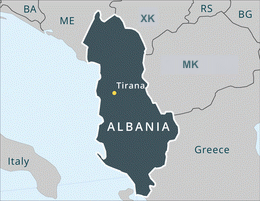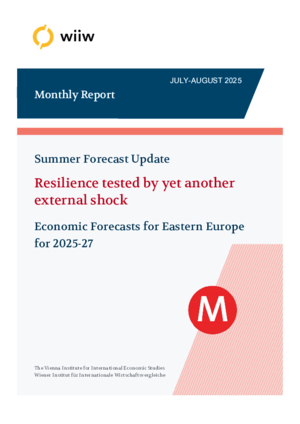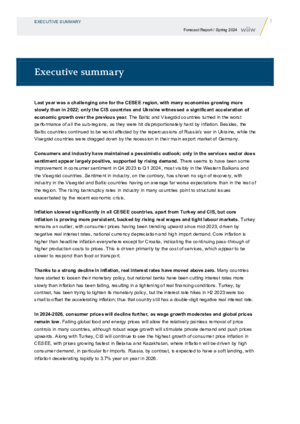Albania

The Albanian economy maintained its positive trajectory in the first half of 2025, with growth expected to hover at around 4% for the entire year, supported by stronger exports of goods and services and by the tourist season. The current account deficit narrowed further in Q1 2025, driven by rising remittances
(up 4%), while FDI inflows (again up 4%, mainly on account of the reinvestment of earnings) remain key to sustaining growth momentum. The domestic currency continued to appreciate further, as tourism, remittances and FDI inflows all expanded. The rise in demand for credit coincided with increased inflation (already 2.2% in May 2025), while consumer confidence strengthened, reflecting better employment conditions and rising real wages. The central bank kept interest rates unchanged, ensuring credit accessibility, though the lending criteria for house purchases were tightened. Public finances remained stable, with revenue growth outpacing spending to maintain a positive fiscal balance in
Q1 2025. Meanwhile, the May 2025 parliamentary elections resulted in a victory for the governing party, which will ensure policy continuity.
| |
|
|
|
FORECAST* |
| Main Economic Indicators | 2022 | 2023 | 2024 | 2025 | 2026 | 2027 |
| Population, 1000 persons | 2778 | 2745 | 2401 | . | . | . |
| GDP, real change in % | 4.8 | 3.9 | 4.0 | 3.7 | 3.9 | 4.0 |
| GDP per capita (EUR at PPP) | 12190 | 13800 | 16930 | . | . | . |
| Gross industrial production, real change in % | 2.7 | -8.4 | -7.6 | . | . | . |
| Unemployment rate - LFS, in %, average | 11.0 | 9.5 | 8.6 | 8.4 | 8.3 | 8.2 |
| Average gross monthly wages, EUR | 520 | 648 | 769 | . | . | . |
| Consumer prices, % p.a. | 6.6 | 5.3 | 2.6 | 2.7 | 2.5 | 2.4 |
| Fiscal balance in % of GDP | -3.6 | -1.3 | -0.7 | -2.0 | -1.8 | -1.5 |
| Public debt in % of GDP | 64.1 | 57.5 | 54.0 | . | . | . |
| Current account in % of GDP | -5.9 | -1.2 | -2.4 | -2.6 | -2.7 | -2.7 |
| FDI inflow, EUR m | 1371 | 1498 | 1584 | . | . | . |
| Gross external debt in % of GDP | 54.1 | 46.3 | 40.4 | . | . | . |
Basic data are continuously updated.
* Forecasts are changed beginning of January, April, July and November.
See Press Conferences.
publication_icon
Monthly Report No. 7-8/2025
Vasily Astrov, Alexandra Bykova, Selena Duraković, Meryem Gökten, Richard Grieveson, Maciej Grodzicki, Ioannis Gutzianas, Doris Hanzl-Weiss, Gabor Hunya, Branimir Jovanović, Niko Korpar, Dzmitry Kruk, Sebastian Leitner, Isilda Mara, Emilia Penkova-Pearson, Olga Pindyuk, Sandor Richter, Marko Sošić, Bernd Christoph Ströhm and Maryna Tverdostup
wiiw Monthly Report No. 7-8, July-August 2025
38 pages including 5 Tables and 3 Figures
Details
publication_icon
Executive summary
Olga Pindyuk
in: The Crisis is Over, but its Scarring Effects are Hindering Recovery
wiiw Forecast Report No. Spring 2024, April 2024 , pp. I-VII
Details
The Albanian economy maintained its positive trajectory in the first half of 2025, with growth expected to hover at around 4% for the entire year, supported by stronger exports of goods and services and by the tourist season. The current account deficit narrowed further in Q1 2025, driven by rising remittances (up 4%), while FDI inflows (again up 4%, mainly on account of the reinvestment of earnings) remain key to sustaining growth momentum. The domestic currency continued to appreciate further, as tourism, remittances and FDI inflows all expanded. The rise in demand for credit coincided with increased inflation (already 2.2% in May 2025), while consumer confidence strengthened, reflecting better employment conditions and rising real wages. The central bank kept interest rates unchanged, ensuring credit accessibility, though the lending criteria for house purchases were tightened. Public finances remained stable, with revenue growth outpacing spending to maintain a positive fiscal balance in Q1 2025. Meanwhile, the May 2025 parliamentary elections resulted in a victory for the governing party, which will ensure policy continuity.


